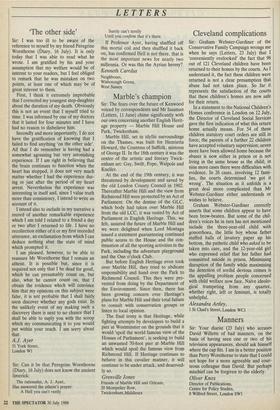Cleveland complications
Sir: Graham Webster-Gardiner of the Conservative Family Campaign wrongs me when he says (Letters, 23 July) that I `conveniently ovelooked' the fact that 98 out of 121 Cleveland children have been returned to their homes by the courts. As I understand it, the fact these children were returned is not a clear presumption that abuse had not taken place. So far it represents the satisfaction of the courts that these children's homes are now safe for their return.
In a statement to the National Children's Homes conference in London on 12 July, the Director of Cleveland Social Services gave the first indication of what this return home actually means. For 54 of these children statutory court orders are still in force; the parents of a further 22 children have accepted voluntary supervision; seven more have been allowed home because the abuser is now either in prison or is not living in the same house as the child; in nine more cases there were difficulties with evidence. In 26 cases, involving 12 fami- lies, the courts determined 'we got it wrong'. The situation as it unfolds is a great deal more complicated than Mr Webster-Gardiner either understands or wishes to believe.
Graham Webster-Gardiner correctly asserts that some children appear to have been brow-beaten. But some of the chil- dren's voices he in turn has not mentioned include the three-year-old child with gonorrhoea, the little boy whose father stuffed balls of lavatory paper up his bottom, the pathetic child who asked to be taken into care, and the 12-year-old girl who expressed relief that her father had committed suicide in prison. Minimising disruption of the family while maximising the detection of sordid devious crimes is the appalling problem people concerned with child welfare now face. Naïve ideolo- gical trumpeting from any quarter, whether right, left or feminist, is totally unhelpful.
Alexandra Artley, 1 St Chad's Street, London WC1














































 Previous page
Previous page